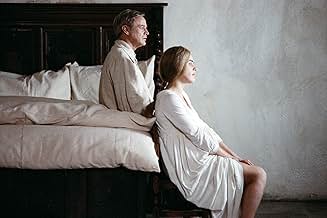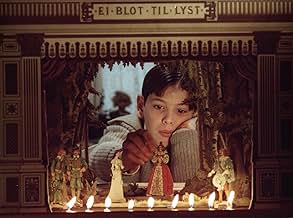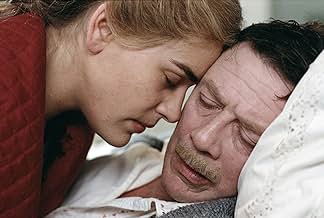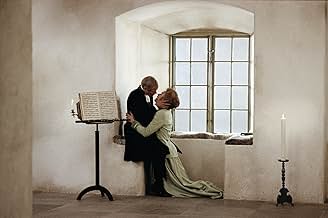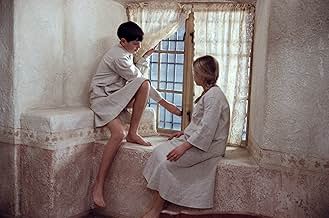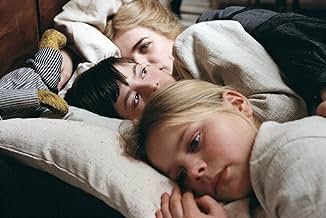Duas crianças suecas vivenciam as muitas comédias e tragédias de sua família, os Ekdahls.Duas crianças suecas vivenciam as muitas comédias e tragédias de sua família, os Ekdahls.Duas crianças suecas vivenciam as muitas comédias e tragédias de sua família, os Ekdahls.
- Ganhou 4 Oscars
- 25 vitórias e 13 indicações no total
Patricia Gélin
- Staty - Ekdahlska huset
- (as Patricia Gelin)
Avaliações em destaque
"Fanny and Alexander" (1982) was announced at the time of its release as Ingmar Bergman's swan song, his last film for the big screen. It is his most optimistic and enchanting blend of romance, tragedy, comedy, fantasy, and mysticism. Set in Sweden in the beginning of the 20th century, the film follows the lives and adventures of two children, brother and sister Fanny and Alexander Edkahl.
I love Bergman in every mood and in every genre - I love him dark, bleak, harrowing ("Shame"), mysterious ("Persona"), merciless and devastating ("Scenes from a Marriage, "Face to Face", "Autumn Sonata). I love his lighter, smiling side ("Wild Strawberries", "Smiles of a Summer Night). Even for a master of Bergman's powerful talent, "Fanny and Alexander" is extraordinary - a profound film which is also one of his most accessible works.
Pablo Picasso said once, "When I was 9 years old, I could paint like Rafael; as an adult, all my life I tried to learn how to paint like a child". In his final film, one of the greatest masters of dark and sometimes morose psychological studies looks at the world with a child's eye. The words he chose to finish his film with reflect the hope, the happiness and the magic that can be fully felt only in one's childhood: "...Anything can happen, anything is possible. Time and space do not exist. ..On a flimsy ground of reality, imagination spins out and waves new patterns." --- August Strindberg's introductory notes for A Dream Play.
I love Bergman in every mood and in every genre - I love him dark, bleak, harrowing ("Shame"), mysterious ("Persona"), merciless and devastating ("Scenes from a Marriage, "Face to Face", "Autumn Sonata). I love his lighter, smiling side ("Wild Strawberries", "Smiles of a Summer Night). Even for a master of Bergman's powerful talent, "Fanny and Alexander" is extraordinary - a profound film which is also one of his most accessible works.
Pablo Picasso said once, "When I was 9 years old, I could paint like Rafael; as an adult, all my life I tried to learn how to paint like a child". In his final film, one of the greatest masters of dark and sometimes morose psychological studies looks at the world with a child's eye. The words he chose to finish his film with reflect the hope, the happiness and the magic that can be fully felt only in one's childhood: "...Anything can happen, anything is possible. Time and space do not exist. ..On a flimsy ground of reality, imagination spins out and waves new patterns." --- August Strindberg's introductory notes for A Dream Play.
10ColeSear
This film could never have been made in the United States. I realize when it was made Bergman had been around for a long time and had his own clout but it still has too much of a philosophical slant to be mainstream here. This film is amazing. The first hour moves at a slow pace but it really sets up the rest of the movie well and then it really picks up. The cinematography is breathtaking and while this story makes you think a lot you don't feel ambivalent towards the characters through the rest of the first film after having been slowly introduced to all the characters you have a certain identifcation that is purely emotional and blends wonderfully with the other aspects of the film. It's truly great and should be considered one of Bergman's best works.
SPOILER: Most of the ideas revealed through mystery by Bergman in Fanny och Alexander have already been addressed by others. The first time I saw this film was in 1984, on tv and with a much shorter version than the one released in England in 2002, which is the full 300-plus minute original.
That day I was scared -really scared- watching the scene where Alexander is been helped to let out his most evil thoughts by Ishmael, a completely mysterious character with supernatural insight. And then, a blackout. You can imagine: if I was truly scared this left me breathless.
Then, almost twenty years passed until I found this remarkable jewel, in its full version, perfectly digitised and audio-enhanced in dvd. I bought a dlp projector and used a previewing room to show it to my students. I didn't know what was going to happen. But that doubt was worth the waiting.
I think it's very difficult to say any other thing than breathtaking to underline what this film accomplishes. It's the reflected work of years of understanding and hard work between Bergman and Nyvqvist. One of the most powerful, beautiful, fearful and perfect films of all times. An exaggeration, like. Yes, but I think that there are no words to explain how plainly perfect this work is. The way it was written. The way it was directed. The way it was lighted. The way it was designed. The way each and every character plays his or her role. The details -not a Bergman's new- to which they paid the most dedicated attention to. The luxurious use of available light. The setting of the story. The amazing locations. Everything in this film was perfectly studied, down to the colour shifts that would take place in every shot!, forget about whole scenes!
The troubling minds of all those characters whose lives are at crossroads. The powerful and eventful lives of just one familiy. The small and big affairs that affect them. Gratitude and hate. Honour and shame. Guilt and love. Fear and joy. Selfishness and generosity. Every long scene exudes with tension, pure fun or pleasure; with increasing uneasiness and abrupt changes of demeanor. With a richness that could only be found where a very skillful eye -trained to see what most disregard as common- finds beauty and harmony. And a sound that is as exhilarating as the narrative depiction.
When the maxim of making "every frame a Rembrandt" comes to my mind, this film makes me think Bergman pushed the envelope a little further: he gives (or I'd rather say, Nyvqyst) the tratment of Van Der Meer or Bosch or Cezanne or Michelangelo to some scenes. (Think the kids playing at the nursery, the housemaidens sewing socks, the meadow and the boat, the transfixing scene of Alexander in the attic with his mother).
And a story told from the eyes of two kids worth a ton of gold. Alexander's (Bertil Guve, when he was twelve-thirteen) enormously powerful and convincing role can certainly be compared to any big-theatre-role actor.
Superb. Don't think you've seen the whole thing until you get the 5 hour full-story.
That day I was scared -really scared- watching the scene where Alexander is been helped to let out his most evil thoughts by Ishmael, a completely mysterious character with supernatural insight. And then, a blackout. You can imagine: if I was truly scared this left me breathless.
Then, almost twenty years passed until I found this remarkable jewel, in its full version, perfectly digitised and audio-enhanced in dvd. I bought a dlp projector and used a previewing room to show it to my students. I didn't know what was going to happen. But that doubt was worth the waiting.
I think it's very difficult to say any other thing than breathtaking to underline what this film accomplishes. It's the reflected work of years of understanding and hard work between Bergman and Nyvqvist. One of the most powerful, beautiful, fearful and perfect films of all times. An exaggeration, like. Yes, but I think that there are no words to explain how plainly perfect this work is. The way it was written. The way it was directed. The way it was lighted. The way it was designed. The way each and every character plays his or her role. The details -not a Bergman's new- to which they paid the most dedicated attention to. The luxurious use of available light. The setting of the story. The amazing locations. Everything in this film was perfectly studied, down to the colour shifts that would take place in every shot!, forget about whole scenes!
The troubling minds of all those characters whose lives are at crossroads. The powerful and eventful lives of just one familiy. The small and big affairs that affect them. Gratitude and hate. Honour and shame. Guilt and love. Fear and joy. Selfishness and generosity. Every long scene exudes with tension, pure fun or pleasure; with increasing uneasiness and abrupt changes of demeanor. With a richness that could only be found where a very skillful eye -trained to see what most disregard as common- finds beauty and harmony. And a sound that is as exhilarating as the narrative depiction.
When the maxim of making "every frame a Rembrandt" comes to my mind, this film makes me think Bergman pushed the envelope a little further: he gives (or I'd rather say, Nyvqyst) the tratment of Van Der Meer or Bosch or Cezanne or Michelangelo to some scenes. (Think the kids playing at the nursery, the housemaidens sewing socks, the meadow and the boat, the transfixing scene of Alexander in the attic with his mother).
And a story told from the eyes of two kids worth a ton of gold. Alexander's (Bertil Guve, when he was twelve-thirteen) enormously powerful and convincing role can certainly be compared to any big-theatre-role actor.
Superb. Don't think you've seen the whole thing until you get the 5 hour full-story.
10anton-6
I have wanted to see this film for years but I have missed it several times they were showing it on television.And also because of my father does not like Bergman(why??) but still think that this film is fantastic.I saw it yesterday just after having read Bergman´s autobiography and this film is much a autobiographical film.
I would like to say something about the cinematography and acting.But what is there more to say about Sven Nykvist´s cinematography then MASTERFUL.Before I saw the film I read in a newspaper that this is the best Swedish acting film ever made and it was actually picked as number two as the best Swedish film ever made for a couple of years ago(film fans voted).The WHOLE cast acts SUPERB,I am not sure if I have ever seen anything more perfect.
This is a chronicle over a family.It has a a great poetic script that combines just as it sad in a other comment:striking visuals.Bergman has really done this to a masterpiece.Now I want to see the five-hour version(i saw the 3 hour version).Colorful,perfect,frightening and sometimes even funny.What I guess I liked most was that they showed everything from the children´s eyes.One of Bergman´s best.5/5
I would like to say something about the cinematography and acting.But what is there more to say about Sven Nykvist´s cinematography then MASTERFUL.Before I saw the film I read in a newspaper that this is the best Swedish acting film ever made and it was actually picked as number two as the best Swedish film ever made for a couple of years ago(film fans voted).The WHOLE cast acts SUPERB,I am not sure if I have ever seen anything more perfect.
This is a chronicle over a family.It has a a great poetic script that combines just as it sad in a other comment:striking visuals.Bergman has really done this to a masterpiece.Now I want to see the five-hour version(i saw the 3 hour version).Colorful,perfect,frightening and sometimes even funny.What I guess I liked most was that they showed everything from the children´s eyes.One of Bergman´s best.5/5
Fanny and Alexander (1982)
**** (out of 4)
The first two words that popped into my mind as the end credits rolled was masterpiece and epic but in some ways I think both of those words are too small to give proper credit to this film. Originally this was meant to be Bergman's swan song and while I would have been a great film to go out on, I'm glad he eventually returned to the director's chair a couple times. This film, running nearly five hours in its complete form, is certainly one of the most beautiful movies that I've ever seen. The technical side of things are downright brilliant but the incredible screenplay and performances make this one of the greatest achievements ever captured on film. The screenplay offers up so much detail and so much thought on so many topics that it's hard to really make your mind up about the film but I'm sure this is the type of movie that a hundred people could watch and they'd all walk away with different feelings and emotions about what it all meant.
For me personally, I think the film is about everything possible, from life to death to love to religion and most importantly to imagination. The movie tackles all sorts of subjects, which were very familiar to Bergman and that's why I'd call this a greatest hits type of packaging from the director. We have issues dealing with death, which we saw in Cries and Whispers. We have the ideas of religion and what it means via his trilogy including Winter Lights. We have ideas of the theater, which the director hit upon in many of his overlooked gems from the 1970's. We also have the beauty of life and love, which we've seen several times from the master.
On the technical side of things there's a lot to admire here. The visual look is quite striking and breathtaking especially the early sequences with the frozen river. The love how the first third of the movie, with the family together, is shown in very rich and vivid colors that really brings out a warm feeling of family and comfort. The middle stuff with the bishop changes to pale colors, which really brings out the coldness of all the characters during this time. We then shift to the grandmother's house, which is full of spring like colors, which offer up a sense of safety. The cinematography by Sven Nykvist really is something to watch as he perfectly captures every mood, feeling and thought going on within the film. He, like the director, was already considered a master by the time this film was released and this movie just adds to his legendary status.
The performances are among some of the greatest I've ever seen. I think the standout performance of the film belongs to Jan Malmsjo as the evil bishop. If this isn't one of the greatest villains in film history then I'm not sure how you would define the term villain. What really impressed me about Malmsjo is his utter coldness whenever he talks, walks or whenever we simply see him thinking. The boy-faced nature on the outside also makes us, at times, feel for him and want to like him but that coldness and evilness is always right there to remind us what a snake he is. Jarl Kulle is also worth pointing out as the loverboy/brother who has a terrific scene where he squares off against Malmsjo in an attempt to get the children back. The outright anger and frustration the actor shows in this scene is very chilling and one can't help but understand and feel everything he's doing. Ewa Froling is also terrific as Emile and the strength she brings to her character ranks this as one of the greatest performances I've seen from any actress. Bertil Guve is also worth mentioning as Alexander. He doesn't have too much to say but it's rather amazing how much Bergman got out of the young actor just by his facial gestures and body movements.
The screenplay is another thing as beauty as, for the most part, we get all dialogue but the dialogue is so well written that all of the heart, sadness and fear comes from it. There are some rather hard to watch scenes including one involving a cane, which is used to beat on of the children. I couldn't help but jump every time the cane hit the body because the screenplay sets up the evilness of the bishop so well that this scene contains alternate emotions. We also have great talk about the meaning of fact and an illusion, which includes talk of actors and how they react to real situations. There's also a great conversation about the Jewish family, being magicians and what effect this has on their theories of God. Then, there's the religious aspect, which Bergman once again attacks with questions and thoughts about the truth behind a higher being. In reality, I believe this film is about the two kids but mainly everything is seen through the eyes of Alexander. All of the subjects hinted at and talked about throughout the film are from a child's eyes and this is something brave to try from Bergman. The honesty and wild wonder of a child's questions are really, to me, what this film is all about and it's brilliantly done by the great director. There are even sequences with Alexander seeing ghosts with a running theme of if he is really seeing them or if they are just in his head.
What's most amazing is that the film runs five hours yet there isn't a single second of the film where the viewer can get bored. There's so much drama, pain, laughter and fears that this carries the film the entire running time and I really wish the film had gone on another five hours.
**** (out of 4)
The first two words that popped into my mind as the end credits rolled was masterpiece and epic but in some ways I think both of those words are too small to give proper credit to this film. Originally this was meant to be Bergman's swan song and while I would have been a great film to go out on, I'm glad he eventually returned to the director's chair a couple times. This film, running nearly five hours in its complete form, is certainly one of the most beautiful movies that I've ever seen. The technical side of things are downright brilliant but the incredible screenplay and performances make this one of the greatest achievements ever captured on film. The screenplay offers up so much detail and so much thought on so many topics that it's hard to really make your mind up about the film but I'm sure this is the type of movie that a hundred people could watch and they'd all walk away with different feelings and emotions about what it all meant.
For me personally, I think the film is about everything possible, from life to death to love to religion and most importantly to imagination. The movie tackles all sorts of subjects, which were very familiar to Bergman and that's why I'd call this a greatest hits type of packaging from the director. We have issues dealing with death, which we saw in Cries and Whispers. We have the ideas of religion and what it means via his trilogy including Winter Lights. We have ideas of the theater, which the director hit upon in many of his overlooked gems from the 1970's. We also have the beauty of life and love, which we've seen several times from the master.
On the technical side of things there's a lot to admire here. The visual look is quite striking and breathtaking especially the early sequences with the frozen river. The love how the first third of the movie, with the family together, is shown in very rich and vivid colors that really brings out a warm feeling of family and comfort. The middle stuff with the bishop changes to pale colors, which really brings out the coldness of all the characters during this time. We then shift to the grandmother's house, which is full of spring like colors, which offer up a sense of safety. The cinematography by Sven Nykvist really is something to watch as he perfectly captures every mood, feeling and thought going on within the film. He, like the director, was already considered a master by the time this film was released and this movie just adds to his legendary status.
The performances are among some of the greatest I've ever seen. I think the standout performance of the film belongs to Jan Malmsjo as the evil bishop. If this isn't one of the greatest villains in film history then I'm not sure how you would define the term villain. What really impressed me about Malmsjo is his utter coldness whenever he talks, walks or whenever we simply see him thinking. The boy-faced nature on the outside also makes us, at times, feel for him and want to like him but that coldness and evilness is always right there to remind us what a snake he is. Jarl Kulle is also worth pointing out as the loverboy/brother who has a terrific scene where he squares off against Malmsjo in an attempt to get the children back. The outright anger and frustration the actor shows in this scene is very chilling and one can't help but understand and feel everything he's doing. Ewa Froling is also terrific as Emile and the strength she brings to her character ranks this as one of the greatest performances I've seen from any actress. Bertil Guve is also worth mentioning as Alexander. He doesn't have too much to say but it's rather amazing how much Bergman got out of the young actor just by his facial gestures and body movements.
The screenplay is another thing as beauty as, for the most part, we get all dialogue but the dialogue is so well written that all of the heart, sadness and fear comes from it. There are some rather hard to watch scenes including one involving a cane, which is used to beat on of the children. I couldn't help but jump every time the cane hit the body because the screenplay sets up the evilness of the bishop so well that this scene contains alternate emotions. We also have great talk about the meaning of fact and an illusion, which includes talk of actors and how they react to real situations. There's also a great conversation about the Jewish family, being magicians and what effect this has on their theories of God. Then, there's the religious aspect, which Bergman once again attacks with questions and thoughts about the truth behind a higher being. In reality, I believe this film is about the two kids but mainly everything is seen through the eyes of Alexander. All of the subjects hinted at and talked about throughout the film are from a child's eyes and this is something brave to try from Bergman. The honesty and wild wonder of a child's questions are really, to me, what this film is all about and it's brilliantly done by the great director. There are even sequences with Alexander seeing ghosts with a running theme of if he is really seeing them or if they are just in his head.
What's most amazing is that the film runs five hours yet there isn't a single second of the film where the viewer can get bored. There's so much drama, pain, laughter and fears that this carries the film the entire running time and I really wish the film had gone on another five hours.
Você sabia?
- CuriosidadesAt the time, the largest film production ever in Sweden (with 60 speaking parts and over 1200 extras) and the most expensive, with a budget of $6 million.
- Erros de gravaçãoAmong the Christmas decorations in the Ekdahl house, there is a garland of miniature flags of the Nordic countries, including the Finnish flag. The Finnish flag was in fact only designed and adopted after Finnish independence in 1917, a decade after the events of the film.
- Citações
Ekdahlska huset - Helena Ekdahl: Everything can happen. Everything is possible and probable. Time and space do not exist. On a flimsy framework of reality, the imagination spins, weaving new patterns.
- Versões alternativasTheatrical version is 188 minutes long. The TV mini-series version is 312 minutes long.
- ConexõesEdited into Fanny e Alexander (1983)
Principais escolhas
Faça login para avaliar e ver a lista de recomendações personalizadas
Detalhes
- Data de lançamento
- Países de origem
- Idiomas
- Também conhecido como
- Fanny & Alexander
- Locações de filme
- Empresas de produção
- Consulte mais créditos da empresa na IMDbPro
Bilheteria
- Orçamento
- US$ 6.000.000 (estimativa)
- Faturamento bruto nos EUA e Canadá
- US$ 6.783.304
- Faturamento bruto mundial
- US$ 6.813.882
- Tempo de duração3 horas 8 minutos
- Mixagem de som
- Proporção
- 1.66 : 1
Contribua para esta página
Sugerir uma alteração ou adicionar conteúdo ausente



